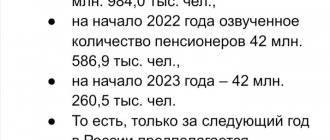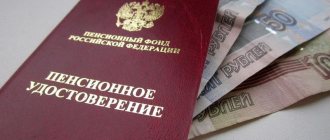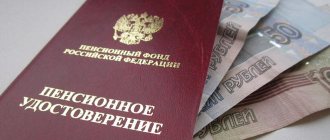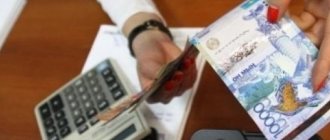Retirement age is changing
If in 2021 Russians retired at 55.5 (women) and 60.5 years (men), then starting next year this will happen a year later. In 2028, the retirement age for women will be set at 60 years, for men at 65 years. But if a person cannot find a job, he will be able to retire two years early.
“Confirmation that a person cannot find a job reveals My health.” The order of the Ministry of Health on this comes into force on January 1.
It states that in addition to paper certificates and medical reports, their electronic counterparts, signed with an enhanced digital signature of a doctor, become valid. It is noted that electronic medical documents can be accessed both in person and remotely. To do this, you need to register, go through identification and authentication on the government services portal. But paper ones, as before, are issued to patients according to their passport, signed by the doctor, certified by his personal seal and the seal of the medical organization (if any), and its stamp is also affixed to them.
For whom the retirement age will not change
Raising the retirement age will not affect everyone.
The retirement age will not change for citizens employed in jobs with dangerous and harmful working conditions. We are talking, for example, about rescuers, workers in mines and hot shops, chemical plants, bus drivers, sea and river fleet workers, etc. The retirement age will remain unchanged for women who have five or more children (see above), disabled people vision of the first group and military trauma, citizens injured in the Chernobyl accident, as well as for citizens who worked as flight test personnel, directly participated in flight tests, etc. Retirement conditions will also remain for the indigenous peoples of the North.
The list of waste for which recycling is required is expanding
From January 1, another part of the list of waste that is prohibited from being buried without recycling comes into force. The document was adopted by the government back in 2021. The list itself consists of three parts: first, the requirements regarding scrap metal came into force, then - waste paper and plastic, and now the time has come for equipment and batteries.
“Today, 20% of the total volume of solid municipal waste is sent to sorting facilities,” said Deputy Prime Minister Victoria Abramchenko, speaking at a meeting of the State Council in December. — By 2024, this figure will be more than 50%, by 2030 — 100%. By 2024, 12% of solid municipal waste will be used for recycling, and by 2030 - 50%.” The planned increase will occur, among other things, due to electronics sent for recycling.
No benefit to the budget
Pension reform will give a negative financial result for the state, Vladimir Putin said. Initially, the government planned that it would be neutral for the budget system until 2024, that is, all the savings from raising the retirement age (reducing the cost of paying newly assigned pensions) would go to increase pensions for non-working pensioners. It was assumed that savings from raising the retirement age in 2019–2024 would exceed 3 trillion rubles. and all these funds will be used to increase the indexation of pensions.
But adjustments announced at the end of August reduced potential savings by RUB 500 billion. in six years. The main change that the president proposed was to increase the retirement age for women from 55 to 60 years, and not to 63 years, as the government proposed. Over the period from 2029 to 2035, the shortfall in income by the Russian Pension Fund compared to the initial government scenario will amount to 3.6 trillion rubles, noted Deputy Prime Minister Tatyana Golikova.
Photo: Vladimir Astapkovich / RIA Novosti
Hunting with bows and crossbows is allowed
The new hunting rules, which come into force on January 1, contain several very important changes. One of the main innovations is permission to use bows and crossbows. Previously, such silent weapons were prohibited.
Another block concerns the rules of hunting in the dark. On the one hand, it will be possible to use light devices, thermal imagers, and night vision devices when hunting ungulates, bears, wolves, jackals, foxes, raccoon dogs, badgers, and beavers. But at the same time, the hunters themselves will need to wear clothes with reflective elements. This is done to reduce the likelihood of accidentally injuring any of the participants in the hunt.
New buildings are equipped with smart electricity meters
All apartment buildings for which construction permits were issued after January 1, 2021 must be equipped with smart electricity meters. The responsibility for installing them rests with the developers. The law on this comes into force on January 1, 2021.
Electricity meters will be connected to the Internet, which will allow consumers to interact with electricity suppliers on the same principle as is now the case with Internet providers, cellular operators and digital television. Smart meters will send electricity consumption data to energy supply companies, freeing apartment building residents from the obligation to manually submit monthly readings.
Why innovations are introduced
Officials argue in defense of the pension age innovations. The first argument is a decrease in the number of citizens capable of working. The second is the increase in life expectancy. The listed arguments, as legislators believe, will aggravate the crisis of the pension mechanism, and to prevent it from happening, they are introducing an increase in the retirement age. They argue that raising the age limit cannot be avoided in order to prevent a disproportion between workers and pensioners and eliminate the shortage of pension fund funds. Opponents of raising the age limit say that the innovation will lead to an increase in the labor force and increased unemployment, since there will not be enough jobs for young people and older citizens who will be forced to work longer.
Opponents and defenders of the reform do not take into account that the pension mechanism is connected with economic processes. The growth of economic indicators leads to a reduction in the number of workers to support pensioners. Innovations will lead to negative consequences: with an increased number of employees, companies will abandon the idea of modernizing production. According to statistics, there are 14 million pensioners working, which is why officials are raising the age limits. By raising the retirement age, legislators do not take into account that pensioners continue to work after 60 years not of their own free will, but because of meager payments.
Proponents of the reform propose not to collect insurance premiums from older employees in order to increase the motivation of employers to employ them. The measure will lead to increased competitiveness and wages for older workers in the employment market and to savings of 1.6 trillion budget rubles. Public human rights activists urge people to ask pensioners until what age they plan to work. It is necessary to organize the raising of age limits, taking into account the opinions of citizens.
It is beneficial for the budget when the number of pensioners in the country decreases, and therefore the number of payments decreases. Members of parliament argue that raising the age limit will lead to an increase in pensions by 1,000 rubles per year and index payments above inflation. It is predicted that the shortage of PF funds will decrease and the burden on workers will decrease. Lawmakers rely on the experience of Western countries, but do not take into account that their level of medicine and life is many times higher than in Russia.
Politicians o. Health Minister Veronika Skvortsova said that a person who continues to work remains active and youthful longer than those who stop working early.
Citizens oppose the position of officials: “You cannot equate office managers and miners, miners, gold miners.” During the discussions, amendments were made to the imperative to preserve benefits for people employed in hazardous industries, mothers of large families and other categories of citizens.
Why do pensioners work in retirement?
According to statistics, 35% of pensioners in Russia work while retired. This is due to low pension payments. It is difficult for people to try on the role of a pensioner, and if a citizen feels the strength and ability to work, has accumulated experience in the profession and life, then the government’s task is to provide him with the opportunity to work and help solve the problems of enterprises. Recognizing that people are in demand at an advanced age will help older people improve their quality of life. The meaning of a pension upon reaching old age is being leveled out. The law establishes that a pension is paid upon the onset of incapacity for work due to old age. The law was introduced in 1956, now times have changed. People at 55 and 60 years old do not lose their ability to work. In 1960–1970, the proportion was 7–8 workers per pensioner. Today, 1.7 workers feed one pensioner. The imbalance has occurred because people born after the war during the era of rising birth rates are now retiring. They are “fed” by the children of the 1980-1990s - the stage of failure in the birth rate.
During the Soviet era, large factories and enterprises created specialized funds to help pensioners who had previously worked at the plant. People had the belief: “I have worked the required number of years - the government is obliged to pay me.” Now the government is pushing people to the idea that they need to take care of their upcoming pension themselves.
In Russia, since 2002, the mechanism for calculating pensions began to operate on the distribution-cumulative principle, instead of the distribution principle. Legislative approval of the savings mechanism in the pension scheme led to the emergence of pension savings. Citizens' consciousness began to change - it is possible to accumulate a pension, and manage the accumulated funds, transfer them to a non-state pension fund. After the “freezing” of the funded part of the pension, a distribution pension scheme began operating, in which workers support pensioners. In 1992, NPFs were legally allowed to operate, introducing pension programs for companies. People were instilled with the idea that the time had come to change the perception of future retirement.
Russia is a country that lives by exporting raw materials. When oil prices rise, stocks on the stock exchanges rise—the pension fund is constantly replenished. When a budget deficit occurred, the funded part of the pension was “frozen”, and the savings were directed to the insurance part of the pension. The situation has become more complicated; the Pension Fund has a shortage of funds to support elderly people. The time has come for people to take care of their future pensions on their own, and not rely on the state. Russia has one of the lowest retirement age levels.
Politicians give the example of the pension payment scheme in America. There, the citizen deducts 40% of wages for insurance premiums, but these funds are not returned to him. The mentality of American citizens is to save for their old age on their own. If you don’t save up yourself, then in your old age you will be left without money.
Prospects for the development of non-state pension funds in Russia
In Russia, non-state pension funds have been created with personal pension savings programs for the people. According to the programs, a citizen has the right to contribute amounts of 150 rubles or more to the fund and ensure a comfortable old age. The government recommends a contribution of 0–6% of monthly wages. Economists believe that the development of personal and corporate NPF schemes is facilitated by the introduction of benefits for companies. Lawmakers plan to achieve a replacement rate of 40%, therefore, the assigned pension should be 40% of the salary received. The coefficient in Russia today is 30%. The average salary is 41,000 rubles, and the pension is 13,700 rubles. To achieve the 40% ratio, it is important to motivate people to save.
Financiers advise using state and non-state schemes for saving pension capital. It is more profitable to store money in a non-state pension fund than in a bank account. Savings are called “long-term money” because they accumulate over a long period, helping the economy of a state or region.
Due to a long period of savings, funds accumulate in NPFs, but they are saved in small contributions. NPFs adhere to a conservative investment policy and contain a diversified range of investments. If citizens set aside funds for retirement on their own, they will accumulate funds for their old age. There is no need to rely on state pensions. The state pension scheme establishes the rules of the game. When problems arise, the state first of all solves them and changes the rules of the game, as it is now. Obligations and decisions about future pensions are in the hands of every citizen.
The goal of modernizing the pension scheme is to increase pensions and improve the well-being of the people. The measures developed by the deputies will provide jobs for older citizens, allow them to retrain and take care of their health.
An expanded list of essential medicines comes into effect
On January 1, a government order to expand the list of vital and essential drugs (VED) comes into force. It has expanded to almost 800 titles.
The list, in particular, includes drugs for patients with multiple sclerosis, hemophilia and Gaucher disease: taliglucerase alfa, ocrelizumab, simoctocog alfa and emicizumab.
In 2021, the government expanded the list of vital and essential drugs by 23 items to 758 items. In October 2021, the list was supplemented with three anti-Covid drugs: favipiravir, levilimab and olokizumab. From the changes in the Vital and Essential Drugs it also follows that the list will include a drug with the international nonproprietary name remdesivir, included in the temporary recommendations of the Ministry of Health for the treatment of COVID-19.
How to get a “rural” bonus if your profession is not listed
Hello! I have a question about the “rural” allowance. Do agricultural aviation pilots fall under the category of agricultural workers, which entitles them to a pension supplement? I did not find such a category in the list approved by the government.
In the “List of jobs, professions, positions, specialties, according to which an increase in the amount of a fixed payment to the insurance pension is established...” (approved by Decree of the Government of the Russian Federation No. 1440 of November 29, 2021), the specialty “agricultural aviation pilot” is not indicated.
But the same 1440th government decree stipulates that the Ministry of Labor and Social Protection of the Russian Federation, on the proposal of the Ministry of Agriculture of the Russian Federation and in agreement with the Pension Fund, can establish “the identity of works, industries, professions, positions, specialties” provided for by the approved list, if any -or agricultural work, production, profession, position and specialty had “other names”. As explained in the Pension Fund, this will make it possible to receive a bonus for pensioners who actually fall under the conditions for increasing the fixed payment, but the records of their place of work and type of activity, recorded in documents on work activity, were formulated differently.
Labeling of clothing becomes mandatory
From January 1, labeling of light industry goods becomes mandatory. First of all, it includes men's, women's, children's outerwear and sportswear, as well as home textiles of all types. The relevant customs codes are listed in the government order dated April 28, 2021.
According to the document, the following types of light industry goods are subject to labeling: items of clothing, including workwear, made from natural or composite leather; blouses, blouses and blouses, knitted by machine or hand knitting, for women or girls; coats, short coats, capes, raincoats, jackets (including ski jackets), windbreakers, windbreakers and similar items for men or boys; coats, short coats, capes, raincoats, jackets (including ski jackets), windbreakers, windbreakers and similar items for women or girls; bed linen, table linen, toilet linen and kitchen linen.
Minimum prices for alcohol are increasing
From January 1, 2021, minimum purchase and retail prices for vodka, brandy, cognac, and champagne will be increased in Russia. Thus, for a 0.5 liter bottle of vodka the minimum price will increase by 5.7% - from 230 to 243 rubles, for 0.5 liter brandy - from 315 to 324 rubles, for 0.5 liter cognac - from 433 to 446 rubles. Champagne with a volume of 0.75 (as well as other products made from wine, grape, fruit, cognac, Calvados, whiskey distillates) will rise in price from 164 to 169 rubles.
Reaction to pension reform
The government announced the increase in the retirement age on June 14, the day the World Cup began in Russia.
First Deputy Prime Minister Anton Siluanov called this a “purely coincidence.” The reaction of citizens to the pension reform led to an increase in protest potential and disapproval of the activities of government institutions, and a decrease in indicators of social optimism, sociologists from the Levada Center pointed out. Rallies and protests against pension reform were held in Russian cities, organized by supporters of opposition leader Alexei Navalny, the Communist Party of the Russian Federation, the Liberal Democratic Party of Russia, A Just Russia and trade unions.
New rules for transporting children's groups on buses will come into effect
Children over 10 years of age will be able to travel on buses, but with mandatory seat belts. Updated requirements for road transportation of children's groups will come into force on January 1, 2021.
There are other requirements for transporting children's groups by bus. The trip organizer must submit a notification of transportation to the State Traffic Inspectorate unit at the district level no later than 48 hours before the start of transportation in intercity traffic and no later than 24 hours before the start of transportation in urban and suburban traffic.
If three or more buses are traveling at once, an application is submitted to have the buses escorted by a State Traffic Inspectorate patrol car. Children under the age of seven cannot travel for more than four hours.
The contents of car first aid kits are changing
Sterile bandages and a sterile dressing bag, as well as small bandages, will be removed from the current first aid kit. Also, bactericidal adhesive plasters are removed from it, and the narrow roll-up patch is replaced with a wide one. But another package of sterile wipes is added. They are supposed to be applied to the wound, if anything happens, and bandaged with non-sterile bandages.
The kit also includes two non-sterile non-woven masks and another pair of gloves. But motorists do not need to urgently change their first aid kit. Old first aid kits can be used until their expiration date, but no later than January 31, 2024. Drivers will be able to replenish the first aid kit themselves as needed.
Making it easier to apply for housing subsidies
Even debtors will be given subsidies to pay for housing and communal services. Only those whose rent debt has been collected by the court and the debt is confirmed by a judicial act that has entered into force will not be able to issue them. In addition, those wishing to apply for subsidies no longer need to provide certificates of absence of debts - the authorities themselves will request this information. However, the president is about to sign a law that proposes to postpone the introduction of this procedure for six months - until July 1, 2021.











